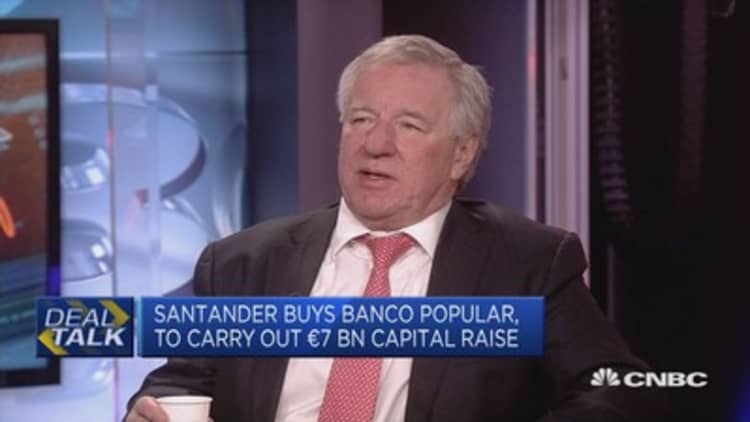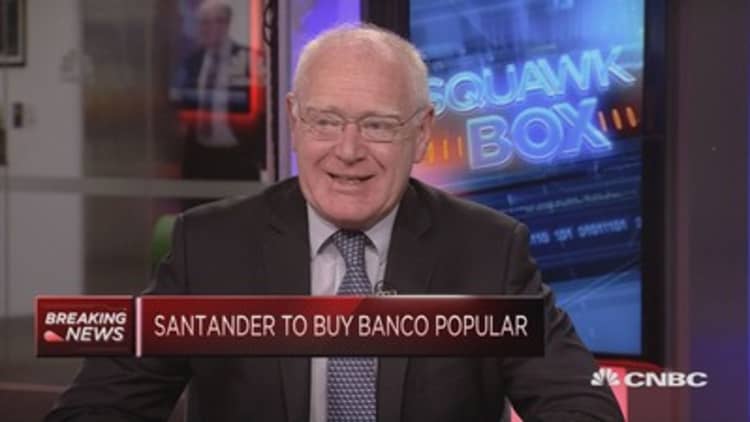
Spain's Banco Popular is facing a cash crunch and is likely to fail, declared the European Central Bank (ECB) on Wednesday, which also announced that the embattled lender will be acquired by its larger peer, Banco Santander, as part of its rescue plan.
"The significant deterioration of the liquidity situation of the bank in recent days led to a determination that the entity would have, in the near future, been unable to pay its debts or other liabilities as they fell due," announced the ECB in statement Wednesday morning, adding that its Single Resolution Board (SRB) had undertaken a resolution scheme which included the Santander acquisition of Banco Popular for the nominal sum of one euro ($1.13).
Santander is set to launch a rights issue to raise 7 billion euros ($7.89 billion) to support the buyout and the subsequent shoring up of its junior peer's balance sheet as part of the 7.9 billion euros Santander is setting aside to cover the target's non-performing assets. Shares of Santander slipped 2.5 percent as European markets opened on Wednesday.
The ECB is absolutely right to undertake this measure, Bob Parker, investment committee member at Quilvest Wealth Management, told CNBC on Wednesday.
"Banco Popular was the one exception to the successful tidy up of the Spanish banking system. And that's why this news on Banco Popular I think was inevitable. It's been under pressure," he opined.

This development is a good start for Banco Popular, given the situation it got to in recent weeks, said Luis de Guindos, Spain's minister of economy, industry and competitiveness in a statement on Wednesday, as it involves maximum protection to depositors and the continuity of activity.
"The operation is carried out without the use of public resources and, therefore, does not lead to an eventual contagion between sovereign and banking risk, as it happened in the past. The current situation is very different from that of 2012, given the good health of the whole financial sector and the Spanish economy in general. This gives the best circumstances to provide the most appropriate and effective solutions under European authority, with the ultimate goal of preserving the stability of the financial system," he said in the statement.
Management at Banco Popular had declined the funding support that had been offered to it in 2012 and instead opted for a series of piecemeal share sales which Parker said had proven ineffective.
"That has been clearly a failure," said the long-term financier, adding that he hoped a potential comparison with the troublesome buyout of HBOS by Lloyds Bank in the U.K. was wrong given the strength of Santander's management.
"A lot hinges on how much of the bad debt are they taking on and I'm assuming that that is actually going to be parceled off into a bad bank and therefore Santander will end up with the viable retail and banking operations," Parker observed.
Without knowing the full facts, it looks as though Santander might have been lent on by the ECB to carry out the rescue mission, suggested Martin Gilbert, chief executive officer (CEO) of Aberdeen Asset Management, talking on CNBC on Wednesday.
"It smacks a bit of the Bank of Scotland (HBOS) / Lloyds where you never know how much pressure is put on the biggest bank in Spain by the central bank. So I'd be surprised if they had agreed to it under duress but that will come out," he said.
"It will be interesting to see how dilutive this deal is for existing shareholders," he added.
Looking to the losers of the situation, Parker said it is obviously the Banco Popular shareholders as well as, he assumes, at least the junior debtholders.
"Now the interesting question is to what extent senior shareholders will have to take a write-off. And I don't know the answer to that yet," he noted.
Although rumors of the potential Santander action had failed to send tremors through Spanish equities on Tuesday, Parker suggested watching spread action between Spanish bonds and safe-haven German bunds on Wednesday.
"What we've seen actually over the last few months is Spanish bonds relative to bunds, the spread has narrowed quite significantly," he observed.


